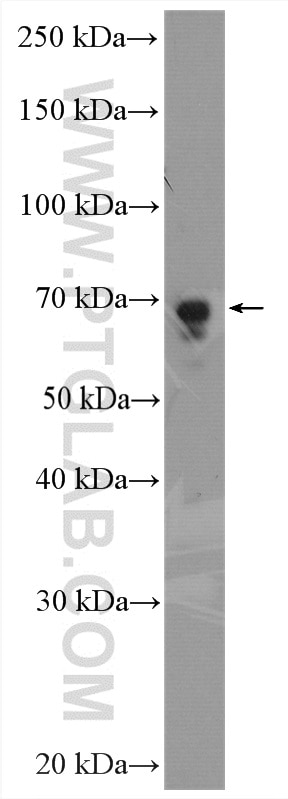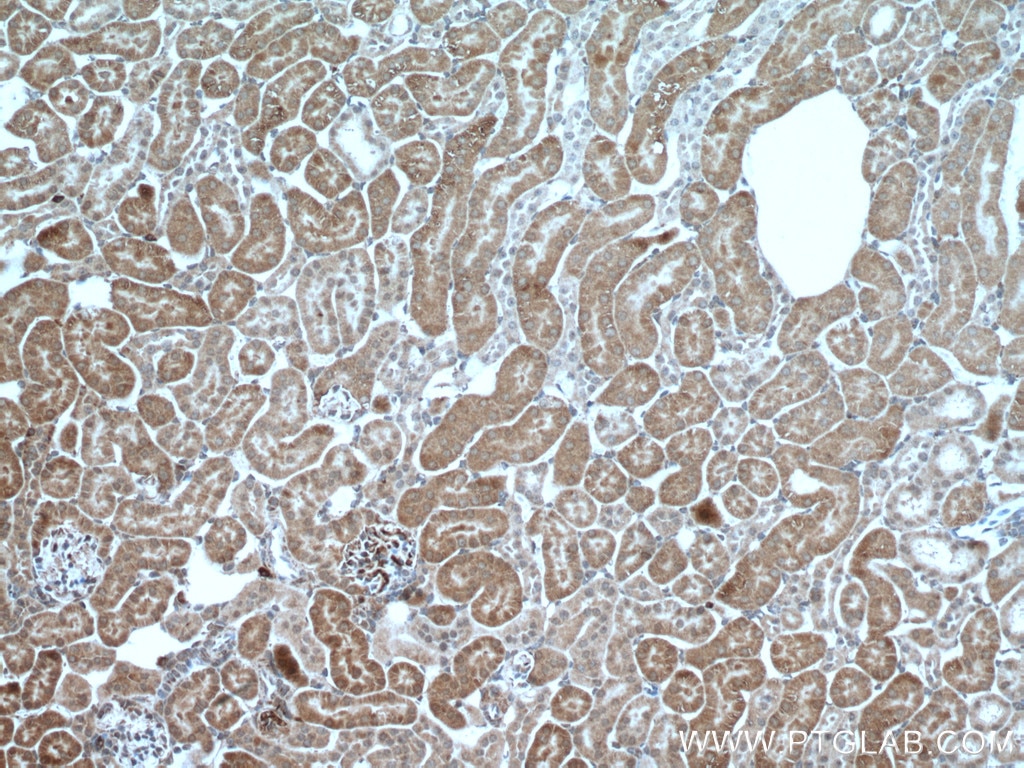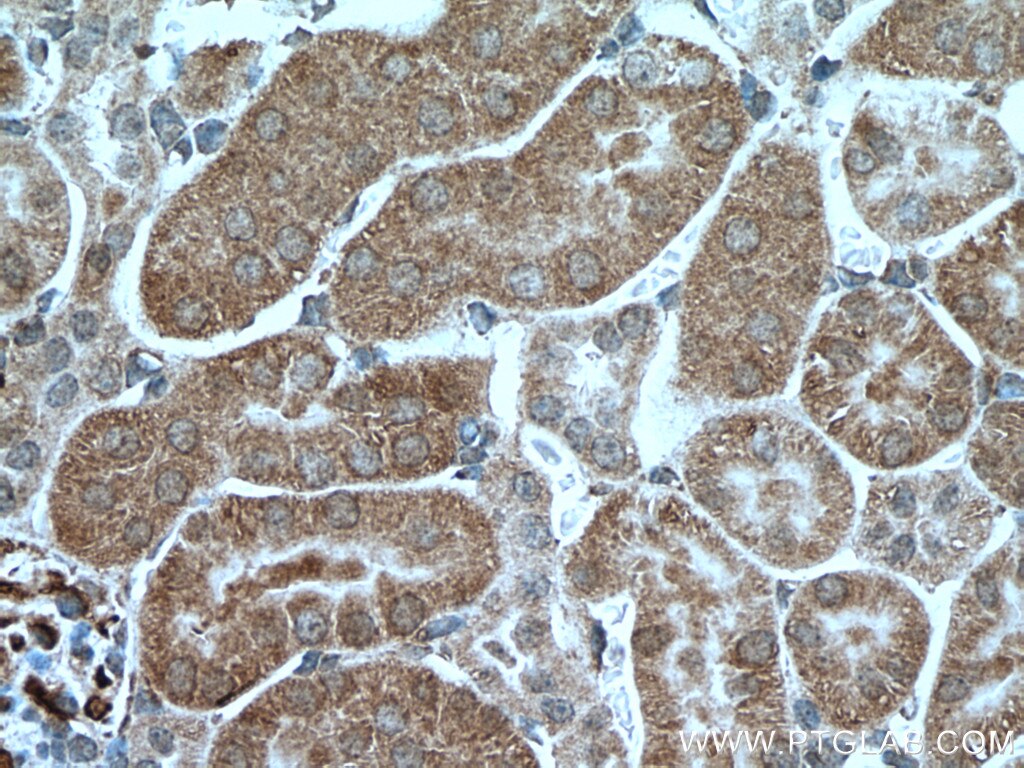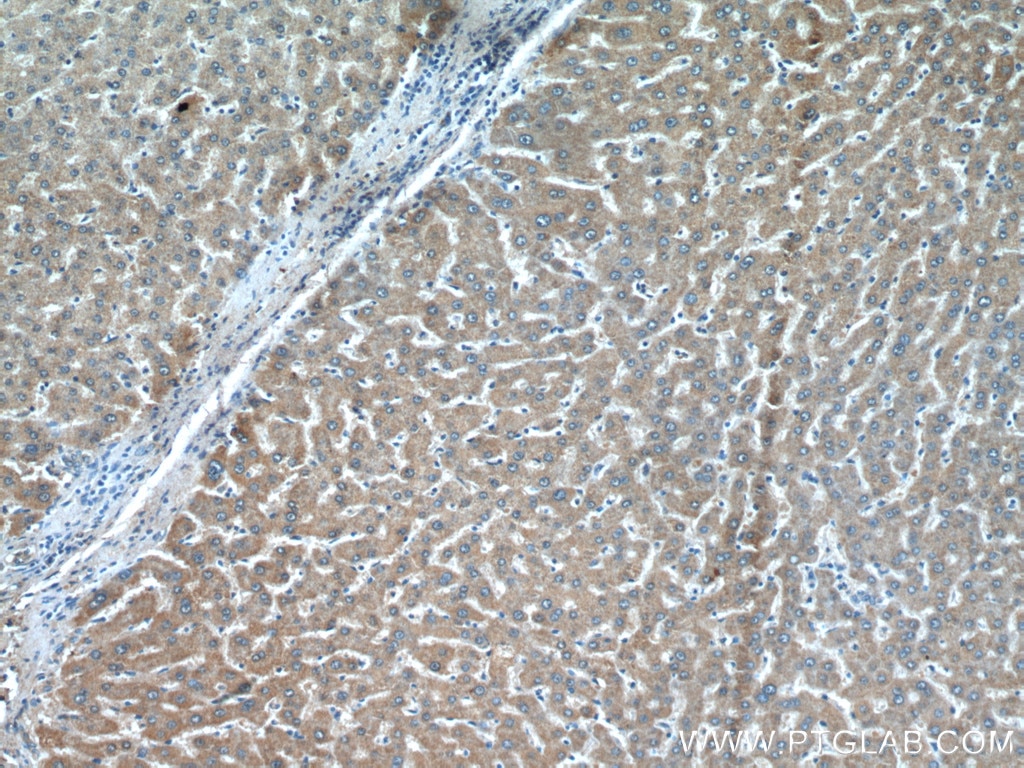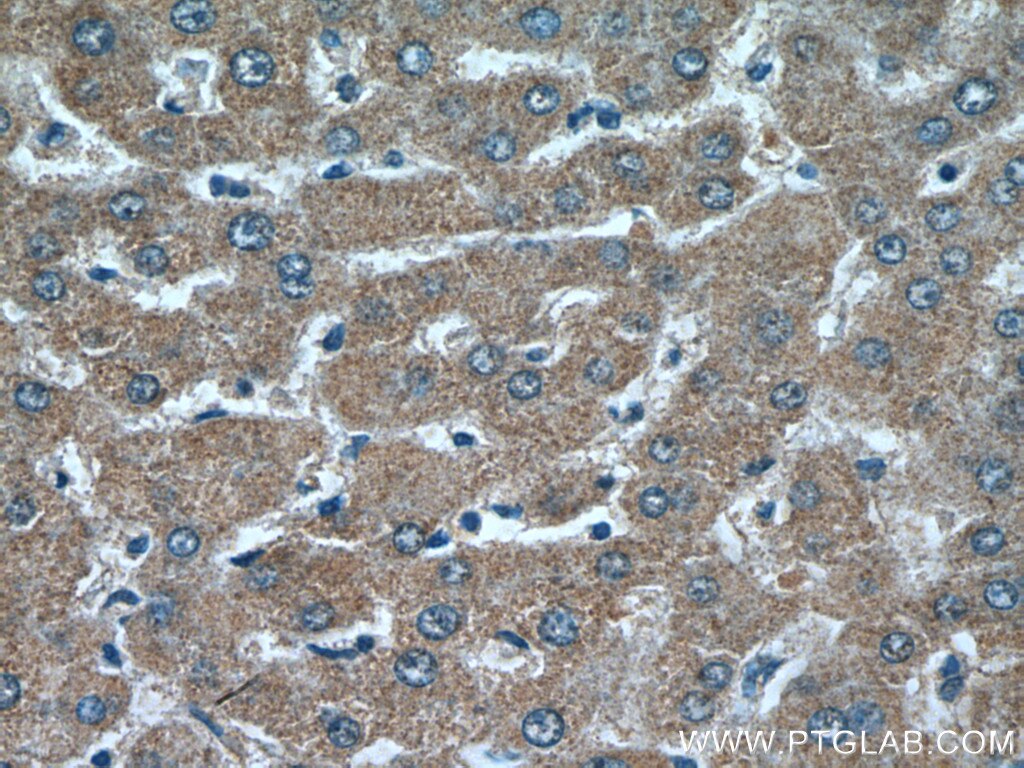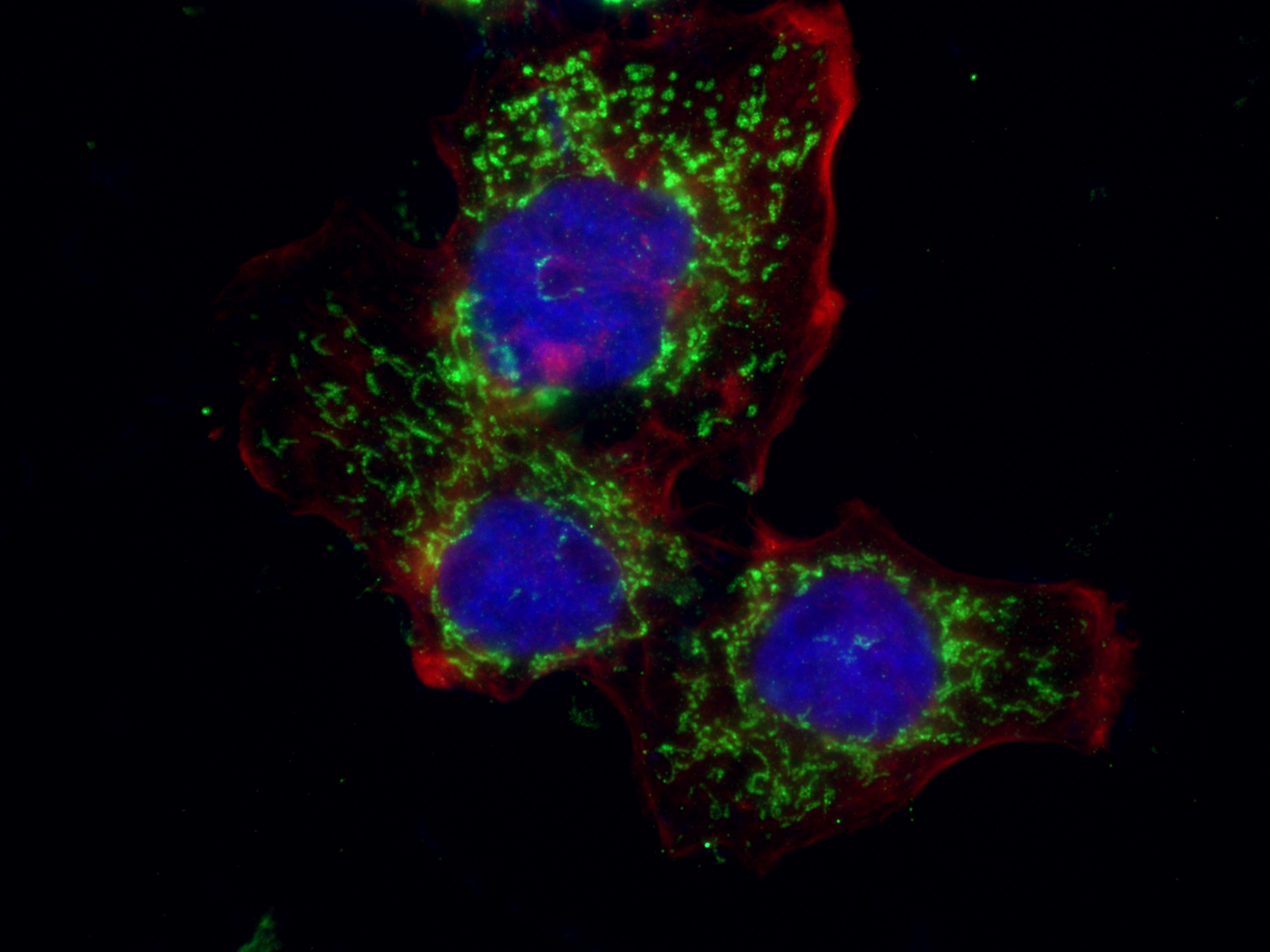Validation Data Gallery
Tested Applications
| Positive WB detected in | mouse brain tissue, rat brain tissue, mouse liver tissue |
| Positive IHC detected in | human breast cancer tissue, mouse kidney tissue, human liver cancer tissue Note: suggested antigen retrieval with TE buffer pH 9.0; (*) Alternatively, antigen retrieval may be performed with citrate buffer pH 6.0 |
| Positive IF/ICC detected in | MCF-7 cells |
Recommended dilution
| Application | Dilution |
|---|---|
| Western Blot (WB) | WB : 1:500-1:1000 |
| Immunohistochemistry (IHC) | IHC : 1:100-1:1000 |
| Immunofluorescence (IF)/ICC | IF/ICC : 1:50-1:500 |
| It is recommended that this reagent should be titrated in each testing system to obtain optimal results. | |
| Sample-dependent, Check data in validation data gallery. | |
Published Applications
| KD/KO | See 3 publications below |
| WB | See 30 publications below |
| IHC | See 5 publications below |
| IF | See 3 publications below |
| CoIP | See 1 publications below |
Product Information
14892-1-AP targets PCK1/2 in WB, IHC, IF/ICC, CoIP, ELISA applications and shows reactivity with human, mouse, rat samples.
| Tested Reactivity | human, mouse, rat |
| Cited Reactivity | human, mouse, rat, pig |
| Host / Isotype | Rabbit / IgG |
| Class | Polyclonal |
| Type | Antibody |
| Immunogen |
CatNo: Ag6681 Product name: Recombinant human PCK2 protein Source: e coli.-derived, PGEX-4T Tag: GST Domain: 292-640 aa of BC001454 Sequence: AGKKRYVAAAFPSACGKTNLAMMRPALPGWKVECVGDDIAWMRFDSEGRLRAINPENGFFGVAPGTSATTNPNAMATIQSNTIFTNVAETSDGGVYWEGIDQPLPPGVTVTSWLGKPWKPGDKEPCAHPNSRFCAPARQCPIMDPAWEAPEGVPIDAIIFGGRRPKGVPLVYEAFNWRHGVFVGSAMRSESTAAAEHKGKIIMHDPFAMRPFFGYNFGHYLEHWLSMEGRKGAQLPRIFHVNWFRRDEAGHFLWPGFGENARVLDWICRRLEGEDSARETPIGLVPKEGALDLSGLRAIDTTQLFSLPKDFWEQEVRDIRSYLTEQVNQDLPKEVLAELEALERRVHKM 相同性解析による交差性が予測される生物種 |
| Full Name | phosphoenolpyruvate carboxykinase 2 (mitochondrial) |
| Calculated molecular weight | 71 kDa |
| Observed molecular weight | 66-71 kDa |
| GenBank accession number | BC001454 |
| Gene Symbol | PCK2 |
| Gene ID (NCBI) | 5106 |
| RRID | AB_2160044 |
| Conjugate | Unconjugated |
| Form | |
| Form | Liquid |
| Purification Method | Antigen affinity purification |
| UNIPROT ID | Q16822 |
| Storage Buffer | PBS with 0.02% sodium azide and 50% glycerol{{ptg:BufferTemp}}7.3 |
| Storage Conditions | Store at -20°C. Stable for one year after shipment. Aliquoting is unnecessary for -20oC storage. |
Background Information
PCK2(phosphoenolpyruvate carboxykinase [GTP], mitochondrial) is also named as PEPCK2, PEPCK-M and belongs to the phosphoenolpyruvate carboxykinase [GTP] family. It catalyses the irreversible conversion of oxaloacetate to phosphoenolpyruvate, an important initial step in hepatic gluconeogenesis.Defects in PCK2 are the cause of mitochondrial phosphoenolpyruvate carboxykinase deficiency (M-PEPCKD). It has 2 isoforms produced by alternative splicing with the molecular weight of 71 kDa and 48 kDa. This antibody has weak cross-reactivity with PCK1 protein due to high sequence homology between PCK1 and PCK2.
Protocols
| Product Specific Protocols | |
|---|---|
| IF protocol for PCK1/2 antibody 14892-1-AP | Download protocol |
| IHC protocol for PCK1/2 antibody 14892-1-AP | Download protocol |
| WB protocol for PCK1/2 antibody 14892-1-AP | Download protocol |
| Standard Protocols | |
|---|---|
| Click here to view our Standard Protocols |
Publications
| Species | Application | Title |
|---|---|---|
Sci Rep TCF7L2 involvement in estradiol- and progesterone-modulated islet and hepatic glucose homeostasis. | ||
Mol Nutr Food Res Douchi Peptides Vy and Sfllr Improve Glucose Homeostasis and Gut Dysbacteriosis In High-Fat Diet-Induced Insulin Resistant Mice | ||
J Nat Prod Effect of 1-Deoxynojirimycin Isolated from Mulberry Leaves on Glucose Metabolism and Gut Microbiota in a Streptozotocin-Induced Diabetic Mouse Model | ||
J Biol Chem Patient-derived organotypic tissue cultures as a platform to evaluate metabolic reprogramming in breast cancer patients | ||
Mol Neurobiol Phosphoenolpyruvate Carboxykinase (PCK) in the Brain Gluconeogenic Pathway Contributes to Oxidative and Lactic Injury After Stroke. | ||
Front Pharmacol Bicyclol Regulates Hepatic Gluconeogenesis in Rats with Type 2 Diabetes and Non-alcoholic Fatty Liver Disease by Inhibiting Inflammation. |

